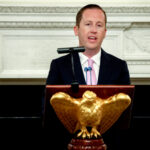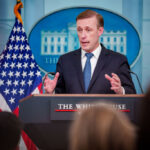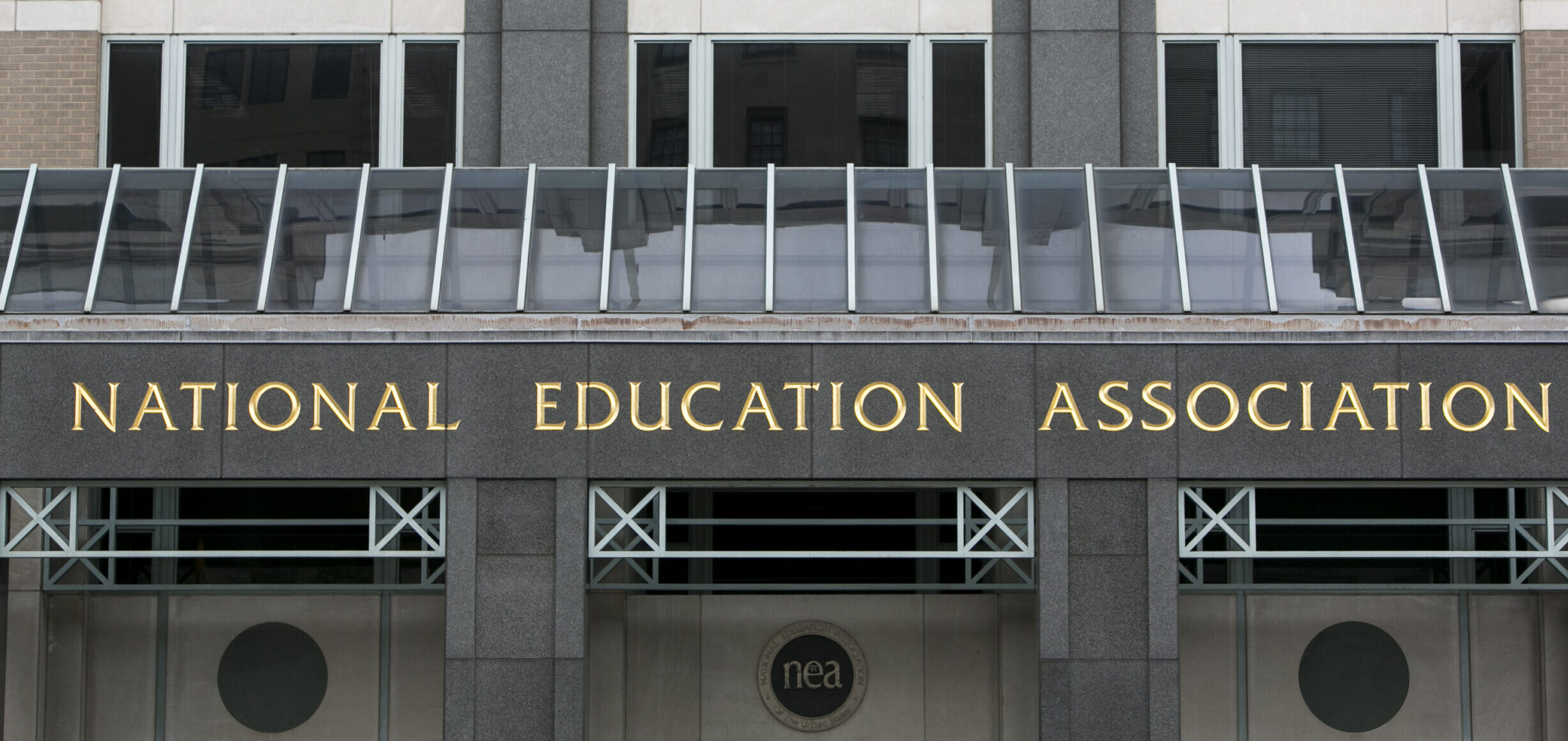A series of contradictory and confusing measures paint a picture of an organization struggling to stake out a position on the controversial issues that have divided its members
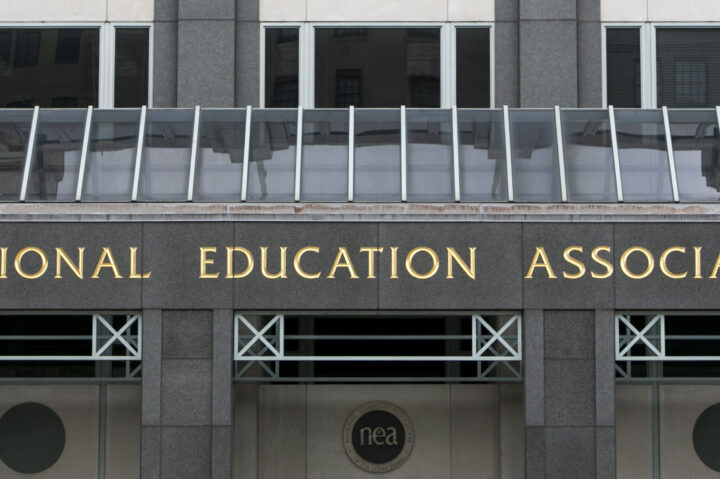
Kristoffer Tripplaar/Sipa via AP Images
A logo sign outside of the headquarters of the National Education Association (NEA) labor union in Washington, D.C. on July 11, 2015.
With a unanimous vote last week rejecting a measure that would’ve cut ties with the Anti-Defamation League, the board of directors of the National Education Association extended an olive branch to frustrated Jewish educators and parents who are concerned about creeping antisemitism within the union’s ranks.
ADL CEO Jonathan Greenblatt told Jewish Insider earlier this week that he was “pleased” to see the NEA reject the anti-ADL measure. But, he added, the union still has a “long way to go” toward making clear that it respects the Jewish community.
Greenblatt’s lingering concern is a sign that the NEA — the largest teachers’ union in the country, with more than 3 million members — has not entirely placated Jewish communal stakeholders. In fact, additional questions have continued to emerge in light of an NEA document that encourages teaching the “Nakba” and that erases antisemitism from the history of the Holocaust.
The Washington Free Beacon reported this week on the NEA’s 2025 handbook, a 434-page report outlining the organization’s “visionary goals” and “strategic objectives.” Among the items included in the dense document are dozens of measures that passed at last year’s “representative assembly,” a convening of the organization’s top leaders from around the country — the same group that, this year, voted to censure the ADL. Several of them have raised eyebrows in the Jewish community.
For instance, the NEA pledged to “celebrate” International Holocaust Remembrance Day with educational materials on the union’s website that “recognize the more than 12 million victims of the Holocaust from different faiths, ethnicities, races, political beliefs, genders, and gender identification, abilities/disabilities, and other targeted characteristics” — with no mention of antisemitism or the Jewish victims of the Nazis. (Another item said that in January, to mark the remembrance day, the NEA’s website will feature a graphic that says “Stand up Against Antisemitism” around a Jewish star.)
One measure said the NEA will use digital communications “to educate members about the difference between anti-Zionism and antisemitism.” Another section promised to “educate members and the general public about the history of the Palestinian Nakba,” or catastrophe, the word Palestinians use to describe the founding of the State of Israel and affiliated displacement of Palestinians.
These contradictory and confusing measures paint a picture of an organization struggling to stake out a position on the controversial issues that have divided its members.
One measure pledges to adopt an antisemitism education plan; meanwhile, another measure seeks to “defend educators’ and students’ academic freedom and free speech in defense of Palestine at K-12 schools, colleges and universities.” It is not clear how any of these goals will be achieved — or what position the NEA will take if the objectives ever come into conflict with each other.
The NEA and its statewide affiliates have faced scrutiny in the two years since the Oct. 7, 2023, Hamas attacks over the politicization of education about Israel and Gaza in classrooms. A report last year found that Massachusetts educators were introducing anti-Israel material into schools. In California, the statewide NEA affiliate began a lobbying push this month against a bipartisan antisemitism bill.
Reversing the anti-ADL measure looked like a step forward for the NEA, but it also came with a step backward. An ADL spokesperson said the “problems identified” in the NEA handbook “underscore how much work it has to do to earn the trust of the Jewish community, Jewish educators and families.”
Some of the measures in the handbook are considered offensive by some Jewish community leaders, but other measures are explicitly focused on countering antisemitism and earned the blessing of Jewish communal leaders. While the contradictory language regarding Jewish issues can create whiplash, it might also open an avenue for dialogue with the union.
An NEA spokesperson declined to comment on any specific measures.
“This document is not a handbook for use in the classroom, but a compilation of the more than 100 resolutions adopted by NEA last year,” NEA President Becky Pringle told JI in a statement. “The NEA has opposed antisemitism throughout its history and is deeply committed to ensuring the safety and inclusion of Jewish educators and students. The NEA regularly shares resources and supports educator workshops on Holocaust education, antisemitism, and ways to promote understanding of Jewish culture, heritage and history.”
The STUDENT Act also expands the NEA charter to prohibit the ‘promotion of antisemitic beliefs’ and Holocaust denial
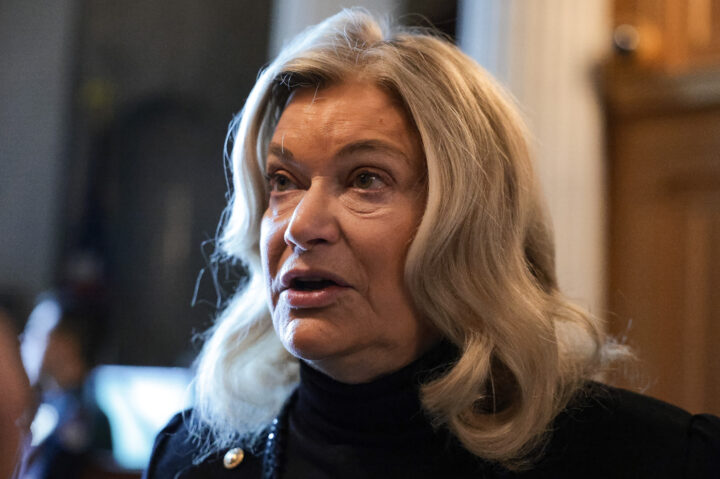
Kayla Bartkowski/Getty Images
U.S. Sen. Cynthia Lummis (R-WY) speaks with press after voting on the nomination of Tulsi Gabbard as President Donald Trump’s director of national intelligence at the Senate Chambers on February 12, 2025 in Washington, DC.
Sen. Cynthia Lummis (R-WY) will introduce legislation on Thursday requiring the National Education Association to expand its federal charter to prohibit the nation’s largest teachers’ union from “engaging in electoral politics or lobbying” in response to the group’s proposal to cut ties with the Anti-Defamation League, Jewish Insider has learned.
Lummis began working on the STUDENT Act in response to the NEA’s representative assembly, the union’s governing body, voting earlier this month at an annual leadership conference to adopt a measure barring teachers from using, endorsing or publicizing any materials from the ADL. The NEA’s board of directors announced on Friday it would not implement the contentious resolution after determining that it “would not further NEA’s commitment to academic freedom, our membership or our goals.”
In addition to the moratorium on involvement in political causes, the bill would add language to the NEA charter banning the “promotion of antisemitic beliefs, including harmful stereotypes about Jewish people, Holocaust denial or minimization, and hatred based on Jewish identity or connection to Israel,” according to a readout from Lummis’ office. It would also bar the organization from “promoting or requiring adherence to critical race theory concepts,” eliminate the union’s tax-exempt status in Washington, prevent them from “calling strikes or work stoppages” and require “all NEA officers to be U.S. citizens.”
Lummis said in a statement on the bill that the NEA had “exploited its federal charter to advance a radical political agenda that puts ideology before education.”
“Federal charters should be reserved for organizations that serve patriotic, charitable, historical, or educational purposes — not for unions that push divisive and antisemitic ideologies,” Lumis said.
Lummis told JI she found the NEA’s original decision on the ADL “to be completely ridiculous and misguided.”
“The fact that such a resolution passed the representative assembly — made up of thousands of NEA members — was reason enough for me to be concerned. Our educational institutions should be strengthening their partnerships with organizations committed to protecting Jewish Americans and combating hatred, not severing these important ties,” Lummis explained, referencing the more than 6,000 union delegates who took part in the three voice votes that were ultimately called in favor of the measure.
The Wyoming senator said the developments prompted her “to examine the NEA’s charter more closely, which revealed how significantly the organization has deviated from its original mission and misused its federally granted charter privileges.”
“It’s evident that the NEA lacks the leadership and vision necessary for self-correction, which is why I’m proposing this legislation. We cannot allow the NEA and other federally chartered organizations to slide toward antisemitic positions,” she told JI.
Sens. Jim Risch (R-ID), Pete Ricketts (R-NE), Ted Cruz (R-TX) and Tim Sheehy (R-MT) cosponsored the bill. Rep. Scott Fitzgerald (R-WI) is working on companion legislation on the House side.
“The NEA long ago transformed from an educational association into a political machine, pushing a progressive agenda that puts activists ahead of students’ needs. The STUDENT Act reins in NEA’s federal charter, restores accountability, and demands a return to its original purpose: educating, not indoctrinating, American children,” Fitzgerald said in a statement.
Greenblatt told JI: ‘We've got a long way to go to make sure that the ADL and our community is respected for who we are’

Jemal Countess/Getty Images for Anti-Defamation League
Jonathan Greenblatt speaks onstage during the 2024 ADL “In Concert Against Hate” at the Kennedy Center Concert Hall on November 18, 2024 in Washington, DC.
Days after the National Education Association walked back a decision by its members to cut ties with the Anti-Defamation League, ADL CEO Jonathan Greenblatt praised the move but cautioned that the union still has a “long way to go” toward making clear that it respects the Jewish community, he said in an interview on Monday.
“I am glad that they recognize what’s wrong about calling out the most consequential organization fighting antisemitism at a time of rising antisemitism,” Greenblatt told Jewish Insider. “Yet at the same time, there are elements of even the statement that lead me to believe that we’re still in this fight. We’ve got a long way to go to make sure that the ADL and our community is respected for who we are.”
While the board of directors of the NEA — the largest teachers union in the country — condemned antisemitism in the statement released last week, the board also stated that the organization’s rejection of the anti-ADL measure was “in no way an endorsement of the ADL’s full body of work.”
Further, the NEA called on the ADL “to support the free speech and association rights of all students and educators.”
“We strongly condemn abhorrent and unacceptable attacks on our members who dedicate their lives to helping their students thrive,” the NEA’s board of directors continued. “Our commitment to freedom of speech fully extends to freedom of protest and dissent whether in the public square or on college campuses.”
That rhetoric surprised Greenblatt, who said he was “pleased” to see the NEA shoot down the anti-ADL measure but concerned and confused about the inclusion of language that he viewed as a swipe at the ADL.
“The idea that the ADL — which, of course, all of our work is predicated on protecting the First Amendment — that we are ‘not supporting the free speech of all students and educators?’ Give me a break. Find the evidence to even support this assertion,” Greenblatt said. “We don’t have a problem with freedom of assembly. We have a problem with those people who use that speech to slander Jews or other minorities. We have a problem with those who use the right to associate to attack Jews and other marginalized communities.”
The NEA and the ADL have never had a formal partnership, Greenblatt confirmed. The ADL would be “amenable” to working more formally with the NEA, but he said their relationship was “not quite that far along.”
The union’s board of directors said the proposal ‘would not further NEA’s commitment to academic freedom’

Kristoffer Tripplaar/Sipa via AP Images
A logo sign outside of the headquarters of the National Education Association (NEA) labor union in Washington, D.C. on July 11, 2015.
The National Education Association, the largest teachers’ union in the country, announced on Friday that it would not cut ties with the Anti-Defamation League, declining to implement a contentious resolution approved by its governing body earlier this month that sought to target the Jewish civil rights organization.
“After consideration, it was determined that this proposal would not further NEA’s commitment to academic freedom, our membership or our goals,” the union’s board of directors said in a statement.
The decision came nearly two weeks after the measure was adopted by the NEA’s representative assembly, its annual leadership gathering that drew more than 6,000 union delegates.
“There is no doubt that antisemitism is on the rise. Without equivocation, NEA stands strongly against antisemitism. We always have and we always will,” the NEA’s board wrote. “In this time of division, fighting antisemitism, anti-Arab racism, and other forms of discrimination will take more resources, not fewer. We are ready.”
ADL CEO Jonathan Greenblatt cheered the union’s decision to distance itself from the “misguided” measure.
“We are committed to working with the NEA and all teachers’ unions to join the Jewish community in making clear these hateful campaigns cannot succeed. They must redouble efforts to ensure that Jewish educators are not isolated and subjected to antisemitism in their unions and that students are not subjected to it in the classroom,” Greenblatt said in a statement.
The measure faced fierce backlash from the Jewish world. A letter authored by the ADL expressing opposition to the proposal — which would have discouraged educators from using teaching materials from the ADL — garnered the support of roughly 400 Jewish organizations across the country, including the leadership of the Reform, Conservative and Orthodox movements.
Other outside Jewish groups, including the Conference of Presidents of Major American Jewish Organizations, the American Jewish Committee and Jewish Federations of North America, released a statement welcoming the NEA’s rejection of the anti-ADL resolution.
The groups signed a letter to NEA President Rebecca Pringle calling out the hostile climate for Jews at the nation’s largest teachers’ union

Dominick Sokotoff/SOPA Images/LightRocket via Getty Images
National Education Association President Rebecca Pringle speaks during the Get Out the Vote Rally in Detroit ahead of the 2022 midterm elections.
Around 400 Jewish organizations and synagogues signed onto an Anti-Defamation League backed letter Monday expressing concern over the “growing level of antisemitic activity” within teachers’ unions, which recently escalated with the National Education Association’s adoption of a measure targeting the leading Jewish civil rights organization, Jewish Insider has learned.
Signatories include the American Jewish Committee, Jewish Federations of North America, Conference of Presidents of Major American Jewish Organizations, National Council of Jewish Women, Orthodox Union, Rabbinical Assembly and Union for Reform Judaism.
The letter, addressed to Rebecca Pringle, president of the NEA — the largest teachers’ union in the U.S. — comes on the heels of a measure passed last week by the association that bars the union from using any teaching materials from the ADL.
The letter urges Pringle to reject the measure, referred to as New Business Item 39, as well as to issue a condemnation of and plan of action to address antisemitism and anti-Israel rhetoric in the NEA.
“The ADL has been a national leader in anti-hate education in K-12 schools for decades and is widely recognized as one of the country’s foremost experts on antisemitism,” the letter states, raising concern that, “although NBI 39 does not explicitly say so, we understand that much of the underlying concern prompting this resolution is directed at ADL’s Holocaust education materials.”
“That reality makes this proposal especially disturbing,” the letter continues. “This is precisely the kind of education that is vital not only to combat antisemitism, but also to fighting hatred and intolerance of all kinds. The effort to exclude ADL’s voice from educational spaces at a time of skyrocketing antisemitism — including in K-12 classrooms — speaks volumes about the climate within NEA that allowed this measure to pass, and the lack of understanding, if not outright hostility, behind it.”
The letter also references several Jewish teachers who spoke out against the resolution at the Representative Assembly, claiming that they were “harassed and shouted down during the proceedings.”
“It is our belief that the goal of those who introduced NBI 39 is to marginalize mainstream Jewish voices within this country’s public school systems and to limit the ability of educators to address the growing threat of antisemitism with their students,” the letter states.
The ADL has criticized the vote, calling it “profoundly disturbing that a group of NEA activists would brazenly attempt to further isolate their Jewish colleagues and push a radical, antisemitic agenda on students.”
“Excluding ADL’s gold-standard educational resources is not just an attack on our organization – it’s a dangerous attack on the entire Jewish community,” Jonathan Greenblatt, the group’s CEO, said in a statement. “We urge the NEA Executive Committee to reverse this biased, fringe effort, and reaffirm its commitment to supporting all Jewish students and educators.”
Even outside of the recent measure, antisemitism and anti-Israel activism in teachers’ unions has been increasing since the Oct. 7, 2023, Hamas terror attacks in Israel. At their conventions last year, both the NEA and the American Federation of Teachers, the second largest teachers’ union in the U.S. — which together represent 4.7 million members — made anti-Israel resolutions a notable part of both gatherings. In July 2024, the NEA signed a joint letter calling on President Joe Biden to halt all military aid to Israel amid its war against Hamas.
Also in July of last year, at the AFT convention, members voted on a total of seven resolutions regarding Israel, including one against the “weaponization of antisemitism” to defend Israel. One of the seven proposed resolutions critical of Israel at the AFT convention passed.
Plus, NEA nixes collaboration with the ADL
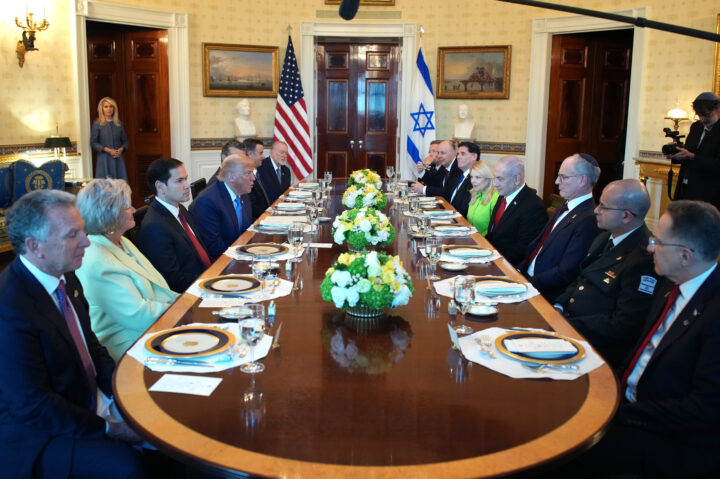
Andrew Harnik/Getty Images
President Donald Trump hosts Israeli Prime Minister Benjamin Netanyahu for a dinner in the Blue Room of the White House on July 7, 2025, in Washington, DC. Trump is hosting Netanyahu to discuss a potential ceasefire agreement to end the fighting in Gaza.
Good Tuesday morning.
In today’s Daily Kickoff, we report on last night’s meeting between Israeli Prime Minister Benjamin Netanyahu and President Donald Trump, and cover the National Education Association’s recent passage of a measure banning coordination with the Anti-Defamation League. We look at concerns from Jewish community security groups and congressional Democrats over plans to shrink the Department of Homeland Security’s Office of Intelligence and Analysis, and spotlight Pepperdine University’s new Middle East policy graduate program, which is being launched in partnership with The Washington Institute for Near East Policy. Also in today’s Daily Kickoff: Sam Altman, Effie Phillips-Staley and Amb. Tom Barrack.
What We’re Watching
- Israeli Prime Minister Benjamin Netanyahu’s Washington trip continues today. He’s slated to meet with Vice President JD Vance, and will head to Capitol Hill later this morning for meetings with House and Senate leadership, including Senate Majority Leader John Thune (R-SD), Senate Minority Leader Chuck Schumer (D-NY) and House Speaker Mike Johnson (R-LA).
- Elsewhere on the Hill, the Senate Armed Services Committee’s subcommittees continue their markups of the NDAA.
- In Sun Valley, Idaho, the annual Allen & Co. gathering formally kicks off today. Look out for the paparazzi photos of vest- and fleece-wearing tech and media moguls arriving at the Sun Valley Lodge.
What You Should Know
A QUICK WORD WITH JI’S MARC ROD
Israeli Prime Minister Benjamin Netanyahu’s third visit to Washington since the start of the Trump presidency kicked off Monday with closed-door meetings with President Donald Trump, Secretary of State Marco Rubio and Middle East envoy Steve Witkoff.
Trump and Netanyahu were on warm terms during remarks to the press ahead of their dinner. Netanyahu offered effusive praise for Trump for the U.S. strikes on Iran’s nuclear facilities and said he nominated Trump for a Nobel Peace Prize, as well as following Trump’s lead in expressing openness to the new Syrian government.
Trump, for his part, deferred to Netanyahu on a question about a two-state solution. “We’ll work out a peace with our Palestinian neighbors, those who don’t want to destroy us,” Netanyahu said. “I think the Palestinians should have all the powers to govern themselves, but none of the powers to threaten us. That means that certain powers like overall security will always remain in our hands. Now that is a fact and no one in Israel will agree to anything else because we don’t commit suicide.”
White House Press Secretary Karoline Leavitt told reporters earlier in the day that Trump’s “utmost priority … is to end the war in Gaza and return all of the hostages” and that Trump and Netanyahu would discuss “peace in Gaza and ending that conflict.”
But that agenda item saw little discussion in Trump and Netanyahu’s public remarks. Asked about talks with Hamas, Trump instead spoke about Iran.
A senior Israeli official in Netanyahu’s delegation told reporters following the Trump-Netanyahu meeting that a deal to end the Gaza war is not on the table because “Hamas is not responsive to the conditions that would allow a comprehensive agreement,” such as demilitarization for Gaza and exile for remaining Hamas leaders, the senior official explained. Without those conditions, “Hamas could do [the Oct. 7, 2023, attacks] again.” More on this from JI’s Lahav Harkov here.
At the same time, the differences between the two leaders’ comments on potential further strikes on Iran indicated a possible point of friction in the future.
Asked about further strikes, Trump said he “can’t imagine wanting to do that” and maintained that Iran’s nuclear program had been “knocked out completely.” Trump added, “I think they want to make peace and I’m all for it,” while also suggesting that there is no need for negotiations or a deal, saying “What’s the purpose of talking?” He said that the U.S. is “ready, willing and able” if further strikes are necessary, “but I don’t think we’re going to have to be.”
SPECIAL RELATIONSHIP
Trump-Netanyahu bromance returns with Nobel Peace Prize nomination
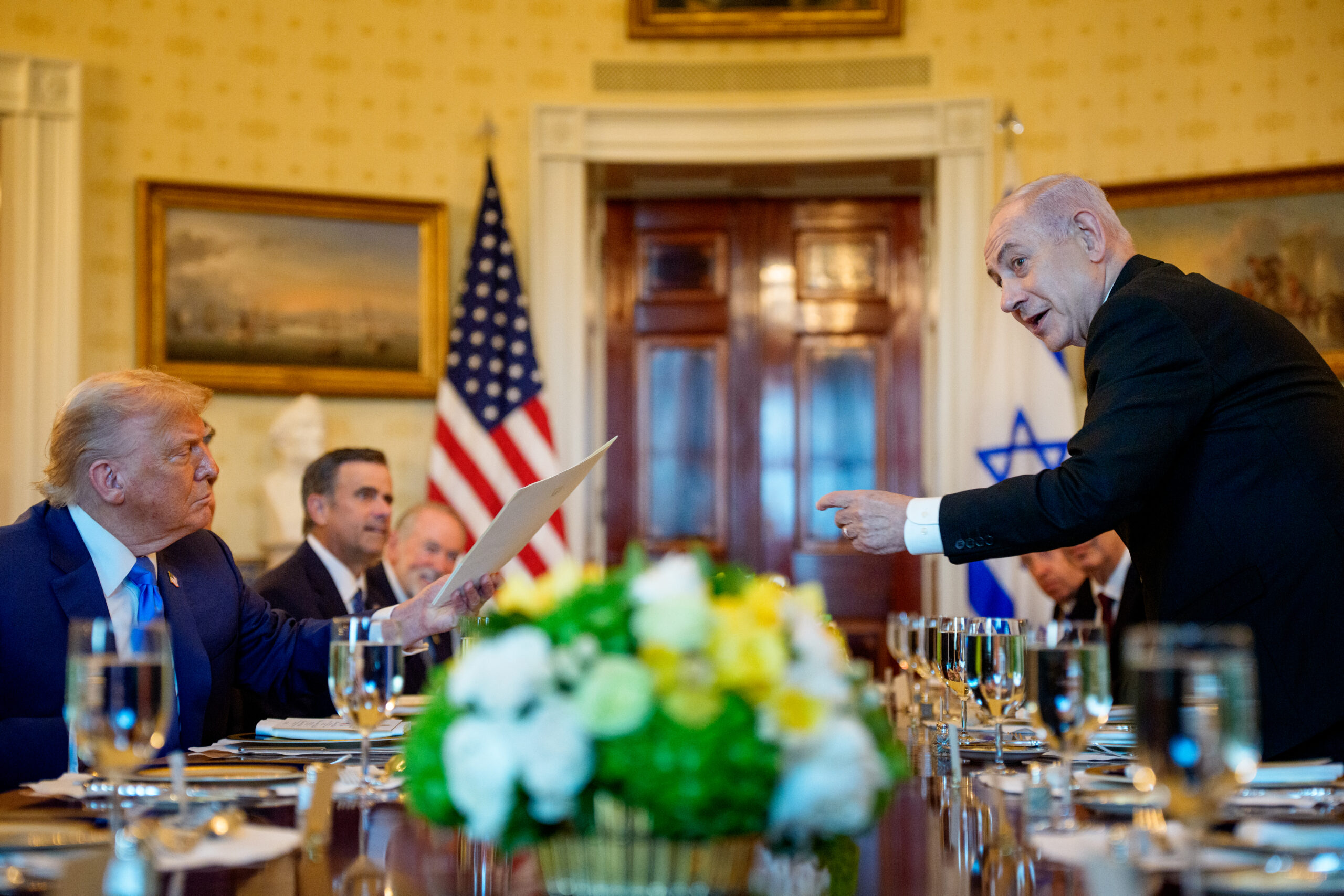
Israeli Prime Minister Benjamin Netanyahu greeted President Donald Trump in the White House Monday evening with effusive warmth, expressing the “appreciation and admiration” of Israel, the Jewish people and “the leadership of the free world” for the U.S.’ recent bombing campaign against Iran’s nuclear facilities. He also offered Trump an avenue toward his elusive goal: receiving a Nobel Peace Prize, Jewish Insider’s Gabby Deutch reports.
Prize goals: “He is forging peace as we speak, in one country and one region after the other. So I want to present you, Mr. President, the letter I sent to the Nobel Prize Committee,” Netanyahu announced, saying it would be a “well-deserved” honor for Trump. “Coming from you in particular, this is very meaningful,” Trump said. “It’s a great honor.”
Notable quotable: U.S. Ambassador to Turkey Thomas Barrack, who is serving as special envoy to Syria, said on Monday that Hezbollah could have a future in Lebanese politics, despite the organization’s designation by the U.S. State Department as a Foreign Terrorist Organization, Jewish Insider’s Jake Schlanger reports. “Hezbollah is a political party. It also has a militant aspect to it,” Barrack said at a press conference on Monday morning in Beirut, following a meeting with Lebanese President Joseph Aoun. “Hezbollah needs to see that there is a future for them, that the road is not not harnessed just solely against them, and that there’s an intersection of peace and prosperity for them also.”

























































